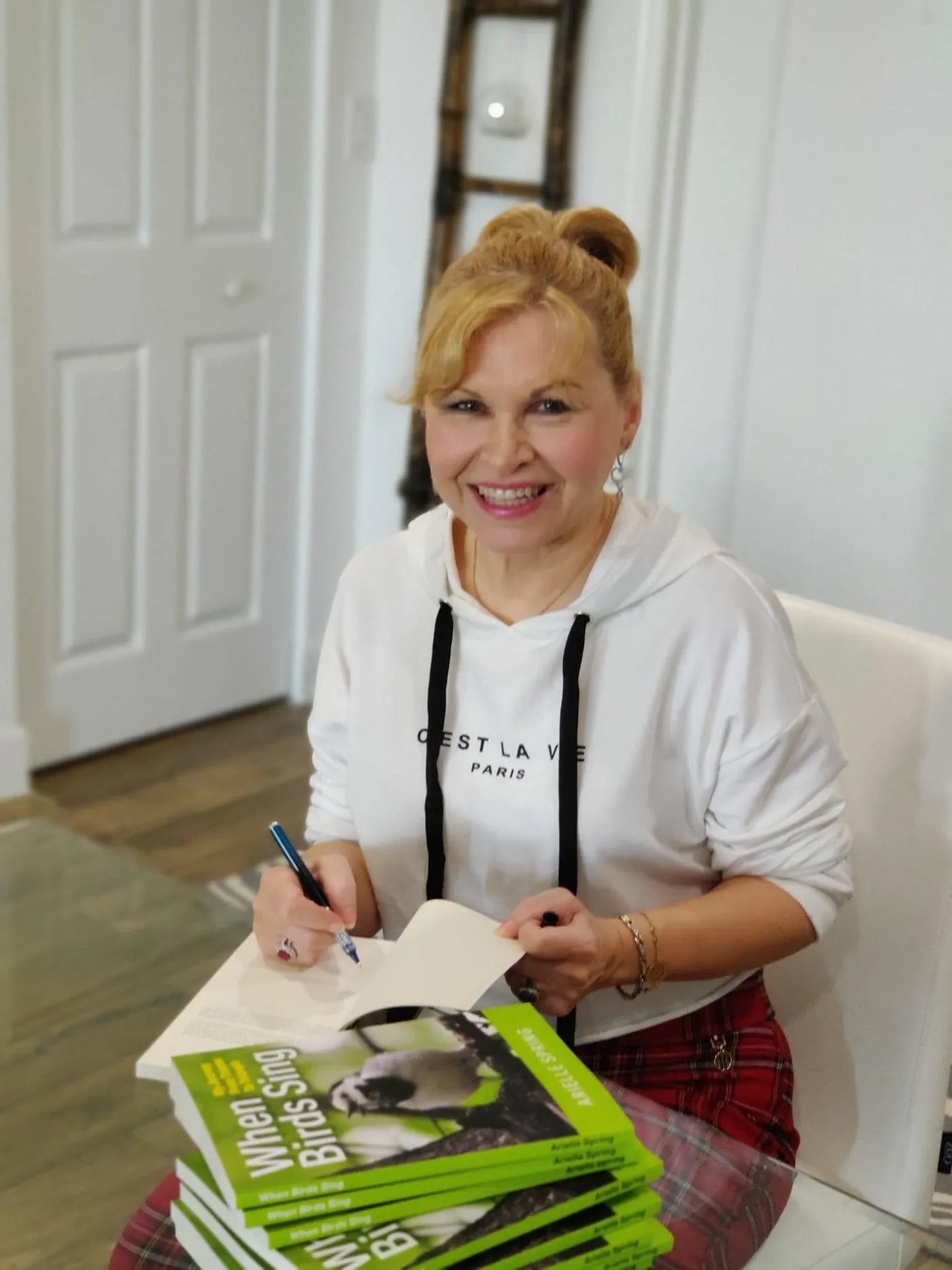Medium.com - Arielle Spring Of Life Coach & Author of “When Birds Sing: My Journey from Trauma to Triumph”: How I Was Able To Succeed Despite Having PTSD
An Interview With Eric Pines
They need time to develop trust in you as they have lost trust and believe they are different from everyone else in the world.
About 5 out of every 100 adults (or 5%) in the U.S. has PTSD in any given year. Many from post-combat. While many people suffer, many people have been able to succeed despite those challenges. What are some things that can be learned from people who have succeeded despite having PTSD? To address these questions, we had the pleasure of interviewing Arielle Spring.
Arielle Spring, author of “When Birds Sing: My Journey from Trauma to Triumph,” is a living example of a phoenix rising. Her idyllic life spiraled out of control for over 20 years due to experiencing many traumas. In her darkest moment, she saw a light to freedom and began her ascent to wholeness. Spring’s openness, insight, and warm empathetic heart has inspired her to share her story. A health and life coach, Arielle also has served as a group facilitator for abuse and trauma victims. Visit: https://www.ariellespring.net/
Thank you so much for doing this with us! It is really an honor. Our readers would love to get to know you a bit better. Can you share your “backstory” with us?
My memoir, “When Birds Sing — My Journey from Trauma to Triumph” painstakingly details my over two-decade spiral into darkness and despair. AND my ascent to my wholeness, healing and triumph over multiple traumas including multiple sexual assaults.
Do you feel comfortable sharing with us the circumstances surrounding how you developed PTSD?
When I was a naïve 16 years old, I was sexually assaulted by may boss’s husband while at work (she had left me in charge while she was in the hospital). I handled the assault with incredible maturity; however, my parents insisted that I return to work the next day to be alone with the perpetrator again. I then began to doubt my ability to make good decisions and ironically, I accepted a date with a new guy in school. He had orchestrated something else. He picked up two other guys from our class and drove to a dark, dirt road outside of town where they all sexually assaulted me. I wore the shame of that night as my new identity for many, many years to come. My shame was fueled by the fact that I did not fight. Later, when researching him when I was writing my book, I learned he had gone to prison for sodomizng a 13-year-old. He had an accomplice then, as well. Learning that he was a violent predator helped me begin to let go of the shame. If I had fought, he may have killed me with the others looking on in disbelief.
What mental shift did you make to not let that “stop you”?
I had a conscious awakening where I broke through the self-talk of the PTSD (“you don’t need help you’re doing fine”) and Complex PTSD (C-PTSD) and got on my knees begging God for help after taking a long, hard look in the mirror at the true reality of where my life was. After I allowed myself to ask for help, I was able to help myself and begin to design my personal recovery plan.
What strategies, techniques, or resources have you found most effective in managing your PTSD symptoms on a day-to-day basis?
Sound sleep allows me to wake up feeling refreshed and rejuvenated for my day. Stretching and exercise including yoga and gyrokinesis help me stay flexible and grounded. Organic foods fuel my body with nutrition along with supplementation, chiropractic, and naturopathic medicine. Talking to my “soul sister”, friends and family help me stay connected with people along with any clients I may have. I also do schema therapy because I am always continuing to go deeper into my healing and personal growth as a wife, certified life and health coach, family member, friend, and member of this great land. Also doing articles, podcasts, presentations, and writing my blog help me heal and grow as well.
Can you tell our readers about the accomplishments you have been able to make despite having PTSD?
Writing my memoir (which took me five years) publicizing it, blogging, social media presence, certification in life coaching and health coaching.
What are the “myths” that you would like to dispel about having PTSD? Can you explain what you mean?
None of us can achieve success without some help along the way.
Is there a particular person who you are grateful towards who helped get you to where you are?
My therapist, Dr. George Recknagel, my husband, Kevin Brown, my soul sister, Lynn Migyanko, my publicist, Jennifer Thomas to name just a few.
How have you used your success to bring goodness to the world?
Through publicizing my memoir so that women can read my story and begin to believe that they came thrive after traumas of all kinds IF they are willing to put in the work on a mind/body spirit level.
Here is the main question of our interview. Can you share “5 things I wish people understood or knew about people with PTSD” and why.
1. They are struggling often to get through a day, so be patient. There is no cure for PTSD — but I’m here to share that it is manageable. Don’t give up — you can heal AND you can THRIVE.
2. They need someone to believe in them because they may have isolated from everyone.
3. They need help in retrieving their true self as it has been buried from the chaos of dealing with their PTSD.
4. They need time to develop trust in you as they have lost trust and believe they are different from everyone else in the world.
5. When they tell you they are in physical pain — believe them. There are many physical symptoms of PTSD, such as, digestive issues, headaches, insomnia, panic attacks, and anxiety and depression.
Has your experience with PTSD influenced your relationships with others?
Yes, I purposely isolated from family and friends for a very long time.
How did you navigate those changes?
I worked on myself doing my best to not have expectations of how others would respond to me. Eventually, I’ve been able to enjoy developing new healthy friendships and re-uniting with family.
What advice would you give to other people who have physical limitations?
Do not give up. Continue to work on your mental state with a therapist, life or health coach that you trust. Amazingly, many of those physical symptoms may dissipate.
We are very blessed that some of the biggest names in Business, VC funding, Sports, and Entertainment read this column. Is there a person in the world, or in the US whom you would love to have a private breakfast or lunch with, and why? He or she might just see this :-)
A director or actor who would like to make my story into a movie, e.g., Steven Spielberg, Jamie Lee Curtis, or Lady Gaga.
Thank you so much for the time you spent with this interview. We wish you continued success and good health!
About the Interviewer: Eric L. Pines is a nationally recognized federal employment lawyer, mediator, and attorney business coach. He represents federal employees and acts as in-house counsel for over fifty thousand federal employees through his work as a federal employee labor union representative. A formal federal employee himself, Mr. Pines began his federal employment law career as in-house counsel for AFGE Local 1923 which is in Social Security Administration’s headquarters and is the largest federal union local in the world. He presently serves as AFGE 1923’s Chief Counsel as well as in-house counsel for all FEMA bargaining unit employees and numerous Department of Defense and Veteran Affairs unions.
While he and his firm specialize in representing federal employees from all federal agencies and in reference to virtually all federal employee matters, his firm has placed special attention on representing Veteran Affairs doctors and nurses hired under the authority of Title. He and his firm have a particular passion in representing disabled federal employees with their requests for medical and religious reasonable accommodations when those accommodations are warranted under the Rehabilitation Act of 1973 (ADA). He also represents them with their requests for Federal Employee Disability Retirement (OPM) when an accommodation would not be possible.
Mr. Pines has also served as a mediator for numerous federal agencies including serving a year as the Library of Congress’ in-house EEO Mediator. He has also served as an expert witness in federal court for federal employee matters. He has also worked as an EEO technical writer drafting hundreds of Final Agency Decisions for the federal sector.
Mr. Pines’ firm is headquartered in Houston, Texas and has offices in Baltimore, Maryland and Atlanta, Georgia. His first passion is his wife and five children. He plays classical and rock guitar and enjoys playing ice hockey, running, and biking. Please visit his websites at www.pinesfederal.com and www.toughinjurylawyers.com. He can also be reached at eric@pinesfederal.com.


